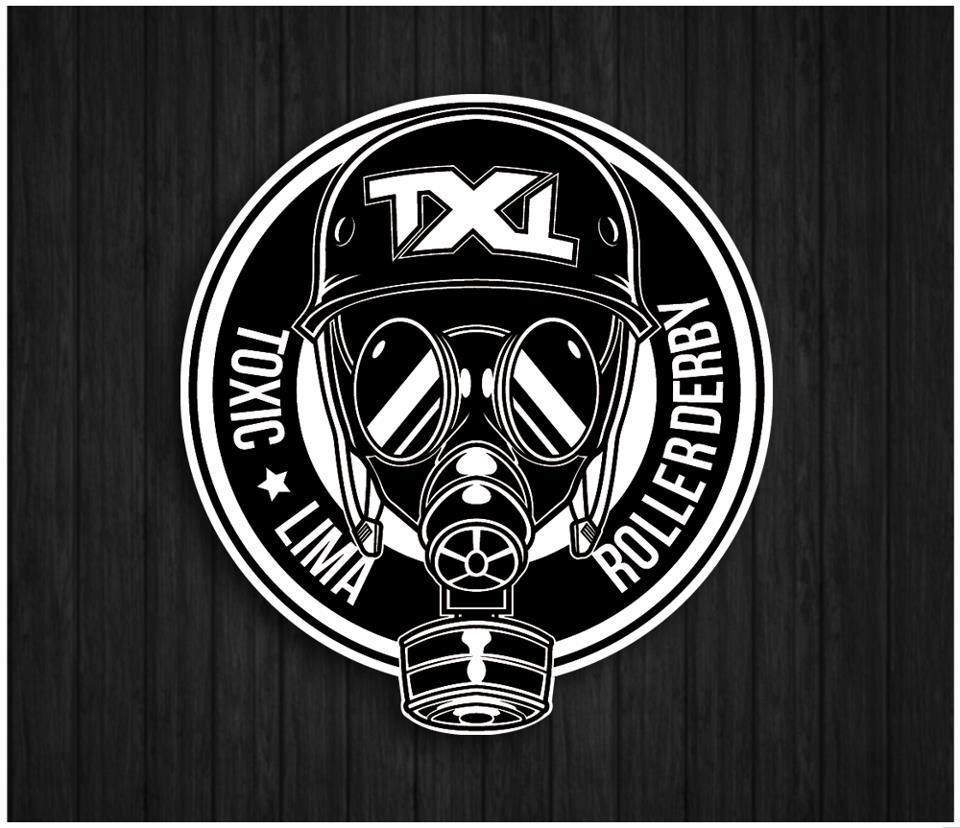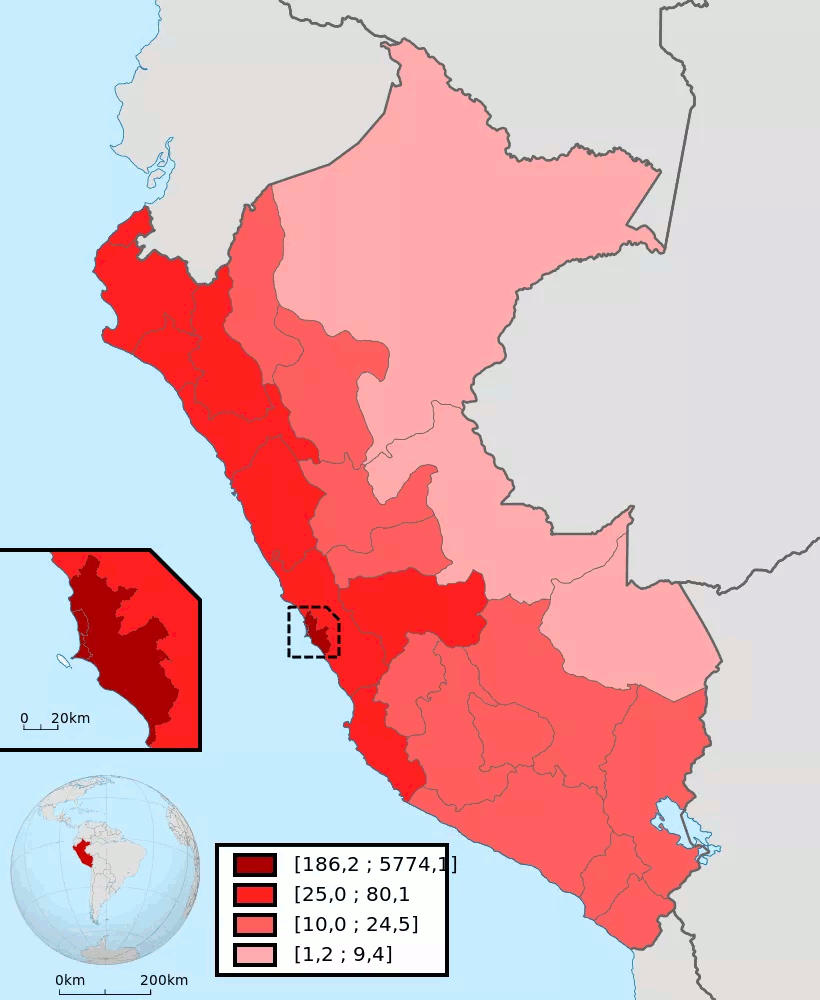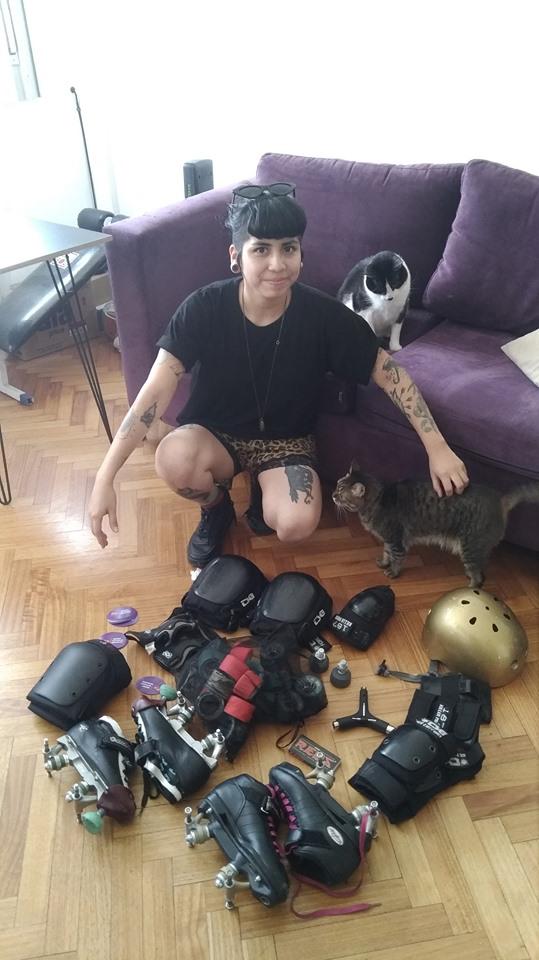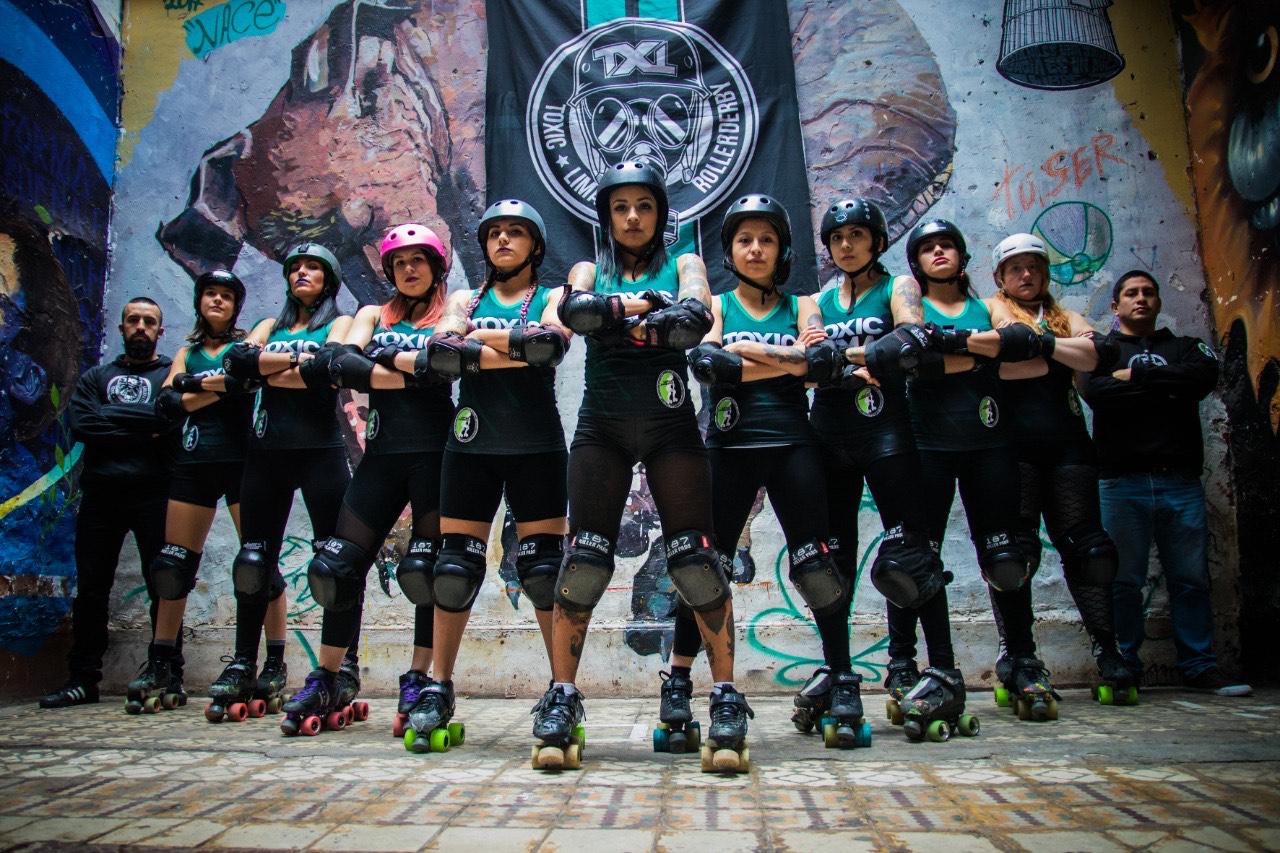Toxic Lima: Roller Derby in Peru 2019
Whilst 2x4 and Sailor City have made Argentine Roller Derby more familiar to the kind of audiences who only follow Division 1, there's been Roller Derby across South America for longer than they might expect.
Since 2010, Perú has hosted Roller Derby in the form of its only league, Toxic Lima Roller Derby . We have been lucky enough to be able to talk to one of their longer-standing members, Twerkin Pony, about the history, and present, of Roller Derby in Perú.

Perú, as with many of the countries of South America, has a strongly concentrated economy and population: the majority of both localised along the coastal region, and within that, concentrated mainly around their capital city, Lima, which is host to about a third of the total population! As such, it is unsurprising that, if Roller Derby is anywhere in Perú, it lives there.

Population density map of Perú [Image: Huhsunqu/Wikimedia Commons licensed CC:BY-SA]
Toxic Lima Roller Derby was founded back in 2010, during the big post-Whip-It international derby boom, but due to their isolation - the closest league to them was in Colombia, almost 2000 km away - they essentially played as an independent local league for three years. Their first experience of playing other teams was a big learning curve, as they attended the self-described First Latin American Tournament , in Bogotá, Colombia, in August 2013, playing the already experienced Mexico City and Ladies of Helltown (São Paulo).
As Twerkin Pony told us:
Back in 2010, it was kinda like a hobby at first; but in 2013 we travelled to Colombia for the First Latin American Tournament, and we discovered Real derby there. We realised that we really had to improve tons of things - we didn't really know the rules, or even positions! We really needed that experience.
Even getting to that point was hard, though, as assumptions in Perú about sports don't help Roller Derby thrive.
[In the beginning, TXL was] a group of girls who wanted to do a sport which was tough, and showed we could be tough. So, in our country, where the only sport that's considered important is football, it was a real challenge to get other girls to notice us. At first, yes, it was really hard, but we've changed that a lot. We've really tried to organise the administrative part of Toxic Lima, committees for [outreach] like communication, social media.
We try to get girls to notice us, and the sport and what it implies. We try to show that the sport is... it's all about attitude, mostly. We can teach them to skate, or how to train their bodies, get muscles... but I think it's mostly the attitude that we need to get girls to try to play Roller Derby.
Also, the training, even the part of human resources, gathering to do activities besides the derby practice. So, yes, we've changed a lot, because we also try to travel a lot since then, to know how the Latin American roller derby community is, and we've learned so much sine the beginning.
In common with most of Roller Derby outside of North America and Western Europe, there are still hard economic issues for Toxic Lima. Roller Skating isn't really a popular activity - especially on quad skates - so all Roller Derby kit is specialist equipment, needing import from the USA or Mexico. Given the average income in Perú, and the weakness of the Peruvian Sol, this is horrifically expensive. As such, Toxic Lima are one of many leagues to have had some support from Derby without Borders ' charitable efforts to support international roller derby.
Derby Without Borders contacted us 2 years ago, and it was awesome because they sent us things that we really need. It's hard to get kit, it makes [rookies] quit derby because they can't get kit fast or they don't have the money. We had help from [Huevo @ Sailor City], they transported the donations, and Barracuda, who was the president of TXL, went to Argentina because she had to work there and met up and brought the kit back. We appreciated that, because they helped bring us stuff - and it was heavy!

Sailor City Rollers' Huevo with Derby Without Borders donation to Toxic Lima arrayed around her.
On top of that, however, travel and space continue to be the biggest issues for Roller Derby in Lima. TXL have tried to foster the growth of the sport in other cities in Peru; helping one initiative in Arequipa (a city in the south of Perú), and a later one in the north of the country... but neither bore fruit in the end. Twerkin Pony is almost resigned to this situation,
We were planning things with [our contact in Arequiba], but she just quit because there was no other support there, so it didn't happen. In Perú, everything just happens in Lima; it's the capital, other cities are much smaller, they're really agro-cities. They're not like Lima; there's a big difference in culture and education and economy between Lima and the other cities.
As it is, then, the only way TXL get games is by travelling to nearby countries: Colombia, Chile, or even Argentina, or to persuade teams to travel to Perú themselves! [Whilst there is derby in Ecuador now, the leagues are not capable of bouting at this time, but maybe in the future...]. This kind of hardship has its upside, in promoting a greater team cohesion,
Being alone in our country, it's hard because we have to spend a lot of money to travel to other countries; to learn and play with other teams. But that has a good side, because, even if we have this thing that makes it really difficult for us - recently, when we've travelled to play with other teams, we've realised that we aren't actually that bad, we're pretty good at what we do - it's really awesome for us to realise that even if we have a lot of obstacles in our way, we can still do good things. We're only 9 to 12 girls when travelling, so it gets us to be really close to each other. We've grown in a lot of things personally, each of us, and that's awesome: to grow, be part of a family that motivates us.
And, conversely, it also means that visiting coaches or teams are cherished for their efforts.
Even if we have the difficulty of being alone in our country, we appreciate it so much when people come to visit us and teach us so many things.
In 2019, this would have culminated in TXL hosting their own Latin American tournament, but tragedy struck when the municipality responsible for their only training venue changed management, and decided that they would not be renewing their contract. Without a venue, it was obviously impossible to host a tournament - or even train effectively.
In Lima it's really hard to get a good place to practice derby because the [football] courts are not in good shape. We were practicing at our old venue for the past 5 years... So it was hard to lose it suddenly: we had a moment where we had to just ask "what are we going to do now?"
For a while, We had to practice in a parking lot, like we used to when we started out in 2010. That was bad, because the floor was bad, and it was outdoors; a lot of girls stopped coming to practice.
We tried to talk to other municipalities, but we didn't even get replies from them.
Eventually, we managed to get the original municipality to talk to us, and negotiated a new contract [but] we've only had the court back since October [2019].
(Since this initial interview, the court has once again required ongoing renegotiation, a process which continues to this date.)
In addition to these problems, TXL has also experienced the usual aging out of older, more experienced skaters - moving on to new things, new places, or becoming new mothers - so 2019 has become a year of rebuilding, and nurturing their newer recruits, a process which is expected to extend into the first half of this year as well.
Toxic Lima are also WFTDA members, having been "auto-graduated" as part of cohort of apprentices still in the system when WFTDA paused the old system for overhaul back in late 2018 / early 2019. [Readers may remember the same surprise happened to Cape Town Rollergirls in South Africa]
We decided to join WFTDA because we saw the opportunities we could have, and because we really wanted to play in other places, and be in the "known" in the public world ranking. (Buenos Aires-based, and only Latin American WFTDA D1 team) 2x4 are really awesome, we haven't played them but they inspire us. They've worked really, really, hard to get to the playoffs: I know some of them have a lot of debts for life because of all the travel for tickets to Europe and USA.
We've been working on [WFTDA membership] since late 2016, because we wanted to be Apprentices, so we did all the paperwork and meetings and things. We travelled to Colombia to play Bogotá Bone Breakers for our graduation game in 2018: that was a big step for TXL. We went there with just 9 girls, and BX3 [had a full roster] so it was a hard game, but it was really fun, they were really really nice to us and taught us a lot... It was just after that that WFTDA paused the Apprentice program, and graduated everyone. It was [a surprise] we went there and had the game, and everything, but because WFTDA said that it wasn't going to be necessary...
Since we graduated, we haven't been able to do much because of the rough months that we've had.

Toxic Lima Roller Derby (July 2018), taken in honour of their WFTDA Apprenticeship [Photo by: Lucia Yap (Copyright reserved)]
Of course, there's more to Roller Derby than just the skating and membership: there's also the culture and politics. Roller Derby's feminist, diverse and inclusive roots are still deeply important to TXL's members - and to our interviewee Twerkin Pony personally, too. All Latin American countries have complex relationships with their inherently diverse populations - depending upon the country, the relationship between the indigenous natives, descendants of Spanish and Portuguese settlers, and later incoming populations can be fraught. In the case of Perú, a majority of citizens identify as Mestizx, a category which acknowledges that they have a mix of native Peruvian and European-Spanish ancestry; the next largest category define as Quechua, the dominant cultural group amongst the original inhabitants of Peru.
Perú, it's a big country, and really diverse. In the league we know it's an expensive sport, and it's not easy to get to every audience because of that - but we made an effort to show them. We are working with members of the native Peruvian population at the moment.
TXL has always been really interested in that - there's no discrimination on the colour of your skin, and we are not classist. There's a lot of diversity in the league - we've never had to talk [explicitly] about it, because we always have been.
Nowadays, we are working on [inclusivity in terms of gender and sexuality] much more. I am an activist feminist and an a part of an organisation which fights street harassment, and we will be running workshops about sexual harassment, diversity, inclusivity.
Roller Derby has always been very inclusive, but now we can see a much stronger political position - we try to be very clear about this with our recruits: [Derby is] not just about drills, but also about politics - we try to teach this to everyone in the league. This is a very important topic to me!
So, what's in the future for Toxic Lima Roller Derby, and Roller Derby in Perú? There's a National Team - although its membership is essentially the same as TXL's - who might need to think about the next Roller Derby World Cup, but that's further in the future.
For now, TXL are concentrating on consolidating, and building: their next recruitment is happening this month, and their previous cohort of rookies are being integrated into the League Proper, becoming members of committees and driving the league itself forward. For later in the year, when the roster is back up to strength, the team are anxious to play more derby, and make use of that WFTDA ranking that they're now eligible for! So, expect to see Toxic Lima playing on the international - or at least Latin American - stage in 2020... this time for points!
TXL are always open to visitors to support the league: if you are thinking of travelling to Lima, and can offer coaching, or any other support to the TXL, please do get in touch with them.
